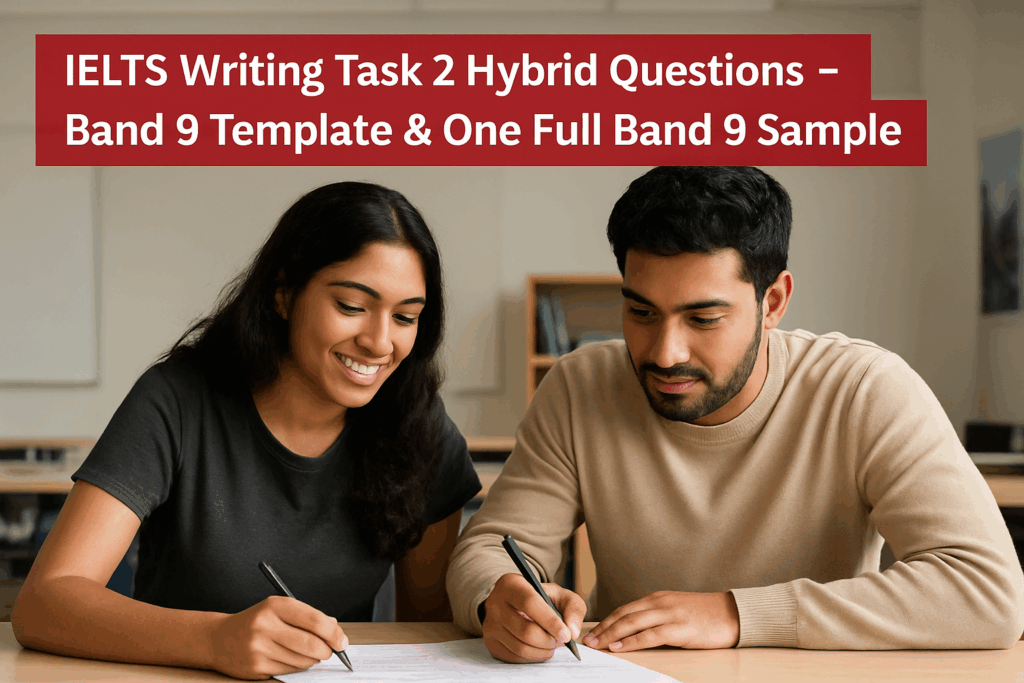
IELTS Writing Task 2 Hybrid Questions – Band 9 Template & One Full Band 9 Sample

Hybrid (mixed) questions in IELTS Writing Task 2 combine two prompts in one—for example, opinion + discussion, or problem/solution + opinion. Examiners expect you to answer all parts clearly, maintain a tight structure, and develop ideas with precise support. Below is a Band 9 template you can safely adapt for most hybrid prompts, followed by a complete Band 9 sample.
1) How to identify a hybrid question
- Contains two tasks (e.g., “Discuss both views and give your opinion”).
- Asks for two outputs (e.g., “What are the causes? And do you think this is positive?”).
- Marks often drop when candidates ignore one part or mix structures.
2) Band 9 universal template for hybrid questions
Pro tip: Underline the two tasks in the question. Allocate one body paragraph to each task. State your opinion twice (intro + conclusion) for clarity.
INTRO (2–3 sentences)
• Paraphrase the topic in one clear sentence.
• Map the essay: “This essay discusses <Task A> and <Task B>, and argues that <your opinion/position>.”
BP1 – Address Task A (9–11 sentences)
• Topic sentence answering Task A directly.
• 1–2 developed reasons with concrete examples/data.
• Mini–counterpoint (optional) to show balance.
• Micro–summary linking back to the question.
BP2 – Address Task B (9–11 sentences)
• Topic sentence answering Task B directly (keep cohesion with BP1).
• 1–2 developed reasons with specific, real-world illustrations.
• Explain consequences/implications to show depth.
• Micro–summary that restates your stance succinctly.
CONCLUSION (2–3 sentences)
• Reaffirm answers to Task A and Task B.
• Restate overall opinion and add a forward-looking insight or policy suggestion.
3) Band 9 sample essay (hybrid: Discuss both views & give your opinion)
Question: Some people believe universities should focus solely on job-related skills, while others argue that higher education should prioritise critical thinking and research. Discuss both views and give your own opinion.
In recent years, tertiary education has been scrutinised for its purpose: to produce job-ready graduates or to cultivate independent thinkers. This essay examines both perspectives and argues that universities must integrate vocational competence with rigorous critical inquiry to remain socially and economically relevant.
On the one hand, proponents of a purely skills-based model contend that universities should align closely with labour-market needs. They point out that employers routinely prioritise candidates who can contribute from day one, particularly in fast-moving fields such as data analytics or healthcare technology. When curricula are co-designed with industry and assessed through authentic tasks—capstone projects, internships, and live case studies—graduates transition smoothly into roles that drive productivity. Moreover, in regions facing youth unemployment, an employability-first approach can reduce skills mismatches and accelerate economic mobility.
On the other hand, universities have historically safeguarded the public good by advancing knowledge and nurturing critical citizenship. Research-led teaching equips students to interrogate evidence, challenge assumptions, and adapt as industries evolve. For example, breakthroughs in renewable energy or epidemiology rarely emerge from short training courses; they rely on scholarly ecosystems that prize curiosity, methodological rigour, and ethical reflection. Graduates trained in critical thinking are also more resilient to automation, because they can reframe problems rather than merely follow procedures.
In my view, the debate is falsely binary. The most robust programmes braid employability with inquiry by embedding technical studios within research-rich environments. A computer science degree, for instance, should pair version-controlled team projects with modules in algorithmic fairness and experimental design. This synthesis develops graduates who are both immediately useful and structurally adaptable—capable of learning new tools while evaluating their societal impacts.
In conclusion, although skills-only pathways promise rapid job placement, and research-only pathways protect the university’s intellectual mission, a deliberate integration of the two best serves students and society. Universities should co-create curricula with industry while preserving the time and space for disciplined questioning; only then will higher education remain both practical and transformative.
4) Band 9 vocabulary & linkers for hybrid prompts
- Task progressors: “To begin with…”, “Furthermore…”, “By contrast…”, “Nevertheless…”.
- Opinion signals: “I contend that…”, “This essay argues…”, “It is more persuasive that…”.
- Cause/Effect: “stems from…”, “precipitates…”, “engenders…”, “yields…”.
- Academic verbs: “interrogate”, “synthesise”, “substantiate”, “contextualise”.
- Precision nouns: “trade-off”, “throughput”, “governance”, “externalities”, “mismatch”.
5) Common mistakes Perinthalmanna candidates should avoid
- Answering only one part of the hybrid question—this caps Task Response at Band 6.
- Mixing structures (e.g., giving solutions in the “discussion” paragraph without signposting).
- Undeveloped examples—always add a quick mechanism (“because… therefore…”).
- Weak cohesion—repeat the stance in intro & conclusion, and use paragraph-level summaries.
- Memorised templates without adaptation—customise topic sentences to the exact tasks.
Study IELTS Writing with Leeds Academy (Perinthalmanna)
Get personalised feedback on Task 2 hybrid essays, weekly mock tests, and vocabulary boosters designed for Malappuram district students.
Call/WhatsApp: +91 9207567111 • Location: Perinthalmanna
6) FAQ
What is a hybrid (mixed) IELTS Task 2 question?
It combines two tasks in one prompt—e.g., discuss both views + give your opinion, causes + solutions + opinion, or advantages/disadvantages + opinion.
How many words should I write?
Write 270–320 words for depth and development; you must exceed 250 words.
Can I use this template for all mixed prompts?
Yes—adapt the topic sentences and examples to match the exact two tasks. Keep one body paragraph per task.
How can Leeds Academy help?
We provide band-based feedback, model answers, and live classes in Perinthalmanna with exam-style timing and topic banks updated for 2025.

